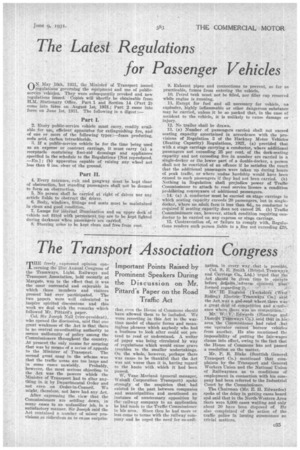The Transport Association Congress
Page 57

If you've noticed an error in this article please click here to report it so we can fix it.
MEE freely expressed opinion con cerning the 21st Annual Congress of the Tramways, Eight. Railways and Transport Association, held reeently at Margate, was to the effect that it was the most successful and enjoyable in which those members and visitors present had ever participated. The two papers were well calculated to inspire spirited discussions and this week we deal with the remarks which followed Mr. Pittard's paper.
Col. Sir Joseph Nall (vice-president), who opened the discussion, said that one great weakness of the Act is that there is Po central eo-ordinating authority to secure uniformity of policy among the Commissioners throughout the country. At present the only means for securing that was by means of a series of appeals to the Minister of Transport. The second great snag in the scheme was that the traffic areas are too large and in some cases unwieldy. Probably, however, the most serious objection to the Act was the powers which the • Minister of Transport had to alter anything i:1i it by Departmental Order and not even an Order-in-Council. We might, therefore, not have had any Act. After expressing the view that the Commissioners are settling dawn, in many cases to an unfamiliar job, in a satisfactory manner, Sir Joseph said the Act contained a number of minor pro visions so ridiculous as cause surprise
that even the House of Commons should have allowed them to be included. We were reverting in this Act to the wartime model of chaotic forms and meaningless phrases which anybody who had a business to look after could not pretend to read or understand. A welter of paper was being circulated by way of regulations which would cause grave troubles to the smaller undertakings. On the whole, however, perhapsthere was cause to be -thankful that the Act was not worse than it is, having regard to the haste with which it had been passed.
W. VaneMorland (general manager, Walsall Corporation Transport) spoke strongly of the suspicion that bad existed in the past between companies and municipalities and mentioned an instance of unnecessary opposition by the 'railway company to an application he had made to the Traffic Commissioner in his area. Since then be had more or less come to terms with the railway company and he urged the need for co-ordi
nation. in every way. that is possible.
Col. S. E. -Smith . (Bristol-. Trapawaya and Carriage 'Co, Ltd.) 'Urged that the Act should be given time to operate before_ cleAnitejadverae opinimis weie formed regardingi t; Me.-11) England [Yorkshire (West Riding) ElectricTramways. Co] said the Act. was a god-send wherathere was-a great tiara of competition and
ainnisance where there was no competition.'.:
Mt. W.•_ V: Edwards (Hastings and Distrgt Tramwaya..Co:) said that in his area the Cortanissioner had ruled that. one 'operator cannot borrow vehicles from another. He also mentioned the impossibility of putting the fair-wages clause into effect, owing to the fact that the Rouse of Commons has not passed
a resolution on the matter. _ Mr. P. R. Blake (Scottish General Transport Co.) mentioned that camplaints by the Transport and General. Workers Union and the National Union of Railwaymen as to conditions of employment in connection with his corn • pany had been referred to the Industrial Court by the Commissioner.
The Chairman (Mr. E. H. Edwardes) spoke of the delay in getting eases heard and said that in the North-Western Area there were 8,000 cases waiting and only about 20 have been disposed of. He also complained of the action of the traffic police in issuing summonses on trivial matters. •












































































































